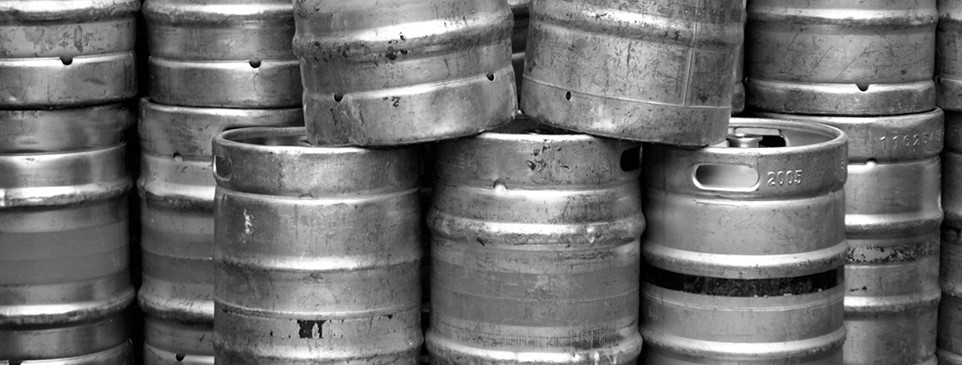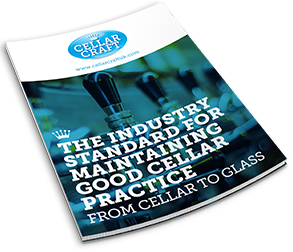Why you should keep a clean cellar

Did you know that under the Food Safety Act (1990) you can be prosecuted and fined if inspectors think that your customers could be at risk of infection from dirty beer lines, cellar and bar equipment? The pertinent term to think about here is “at risk”, which means that no evidence of someone coming to harm is required and it is only based on what the inspector believes.
If your cellar is not kept clean then you can cause yourself a number of problems, and not just issues with the law. Bacteria and wild yeast can grow in the cellar environment and whenever you change the casks or kegs, these can become infected if the bacteria and wild yeasts are disturbed and become air borne or fall onto the cask or keg. These contaminants can then affect your beer line system causing flavour taints, cloudy/hazy beer, increased wastage and numerous customer complaints. There are cases of bacteria which can grow in the cellar and on cellar walls, which gives off a gas from the Ethylene family which can leach through the plastic wall of beer lines causing unpleasant earthy taste to your beer.
All the Do’s
- You should aim to clean the cellar at least once per week, usually the most convenient time would be before your weekly dray. This will allow you room in the cellar to move things around and get into all the corners and those nooks and cranny’s that are difficult to reach. Remember to remove any loose debris such as old keg caps, and general dirt also if mould starts to appear on the walls spray with a good bactericidal product. Keep a record of when you cleaned the cellar and who did it, the same as you would for your kitchen, this can be used as proof of good hygiene practices if you get a visit from the Environmental Health Officers.
- Empty any bins or waste containers that you keep in the cellar before they overflow and on a regular basis to prevent any bacteria or bad smells building up. While it is best to remove any waste as soon as it is created we know this can be difficult in busy times, but a dirty overflowing bin is great at attracting vermin and being a bacterial breeding ground which can cause bad odours.
- Try not to spill beer or drinks products on the floor, but if you do then clean them up immediately. Spills are an accident waiting to happen and the sweet smell of dried beer will attract vermin into the cellar as well as act as a perfect place for bacteria to grow.
- Clean your drains, sumps and pumps. Dirty water or effluent in the cellar area is very unhygienic as it can stagnant and become an ideal bug breeding ground, you do not want water potentially contaminated with sewage or bacteria to be anywhere near your beer.
- Clean walls and ceilings to keep down the growth of wild yeasts, moulds and bacteria. If you find areas where the paint is peeling from the walls or are having a hard time keeping any contamination under control, then call in a specialist contractor to give you some advice on how to proceed.
- Keep a vigilant eye out for evidence of mice and rats. If you spot any evidence of unwanted visitors call in a pest controller as soon as possible.
Click here to download your FREE guide and posters on maintaining good cellar practice
All the definitely Don’ts
- Do not use any strong smelling disinfectants as these can leave taints. Try to keep everything you use in the cellar classified as food safe. Food safe equipment is designed to preserve the product and prevent any bad smells from getting into the beer line system and tainting your beer, cask beers are especially susceptible to this as they are open to the air during dispense when the peg is removed.
- Do not store food in your cellar. While the cellar should be treated as a food environment it is not a suitable place to store kitchen food as the temperature is too high and the risk of contamination too great, also any bacteria from the food could get into your beer and vice versa.
- Do not smoke in the cellar. Firstly, this is illegal in the UK and has been since the introduction of the Smoking Ban (part of the Health Act 2006) on the 1st July 2007. Secondly, in the same way that strong smelling chemicals can contaminate your drinks with an unpleasant odour so can tobacco smoke and flavoured vaping products. Smoking or the naked flame can also increase the risk of fire or explosion within a confined space.
- Do not allow animals into the cellar. In the same way that vermin in the cellar is unhygienic so is allowing the family pet/s.
- Do not leave items such as cask fittings soaking in water or leave water in cleaning vessels and buckets. Water starts to spoil very quickly and as it begins to stagnant is the perfect place for bacteria and moulds to grow. If you leave it hanging around in your cellar you have basically given these contaminants a free ticket to set up shop and thrive. Keep everything as clean and dry as possible.
If you have any cellar hygiene problems and would like expert advice Just Ask CellarCraft

Download the entire CellarCraft guide

